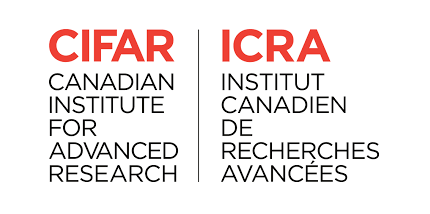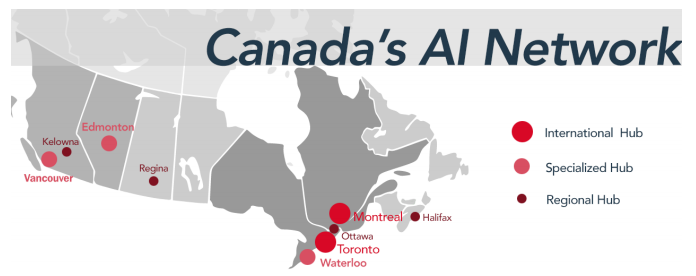
"Giant sums of money spinning into Canada"
Canada: AI Giant’s Moment of Truth
How much of Canada’s AI wealth—critical tech for robotics and automation—will be gobbled up by foreign interests?
“Canada has around 650 AI start-ups. The question is whether these companies will evolve
into vibrant independent companies, or just disappear into a company like Apple or Google.”
—Éanna Kelly, Science | Business
Is it “déjà vu all over again”?
Looks like the Klondike Gold Rush (1896) all over again, but this time around the glitter is AI.
Back in the day, the Klondike River saw 30,000 miners and over 4,000 mining claims. Today, the Yukon treasure is mined by large corporations…only!
Is Canadian AI about to ditto the Klondike Gold Rush? Éanna Kelly, writing for Science|Business, asks that very question.
“Canada has around 650 AI start-ups. The question is whether these companies will evolve into vibrant independent companies, or just disappear into a company like Apple or Google.” — Éanna Kelly, Science | Business
Seems that there are 650 well-nuanced, new ideas in artificial intelligence? That alone is fascinating: 650 AI startups, each with a new twist on AI! Amazing, and good. Canada is exceedingly fertile these days.
See also: The Canadian AI Ecosystem: Profile
 In 2017, the Government of Canada appointed CIFAR (Canadian Institute for Advanced Research) to develop and lead a $125 million Pan-Canadian Artificial Intelligence Strategy, the world’s first national AI strategy.
In 2017, the Government of Canada appointed CIFAR (Canadian Institute for Advanced Research) to develop and lead a $125 million Pan-Canadian Artificial Intelligence Strategy, the world’s first national AI strategy.
It’s objectives:
- To increase the number of outstanding artificial intelligence researchers and skilled graduates in Canada.
- To establish interconnected nodes of scientific excellence in Canada’s three major centers for artificial intelligence in Edmonton, Montréal and Toronto.
- To develop global thought leadership on the economic, ethical, policy and legal implications of advances in artificial intelligence; and,
- To support a national research community on artificial intelligence.
Realistically, however, many of the 650 won’t survive at all, many others are going to slip into the portfolios of corporate big boys, and a few may blossom into corporate big boys themselves. What in all of it is the net-net for Canada?
Kelly offers some insight:
The world’s tech powers are sending giant sums of money spinning into Canada, but while many see this as a sign of success, others are worried about researchers and intellectual property being swallowed wholesale.
The country is in the midst of an artificial intelligence (AI) boom, with Google, Microsoft, Facebook, Huawei and other global heavyweights spending millions or even hundreds of millions of dollars on research hubs in Quebec, Ontario and Alberta.
Canadian doors are open – some fear too open.
See related: Canadian Robotics: Ingenuity & Practicality:
First of a 3-part series on Canadian robotics
Canadian Robotics Muscles into Prime Time
A robotics ecosystem that was always very good is now wow! Why?
Second of a 3-part series on Canadian robotics
Canadian Robotics: Ingenuity and Practicality
On the road to find out: Vancouver to Waterloo
Third of a 3-part series on Canadian robotics
Canadian Robotics: Ingenuity and Practicality
On the road to find out: Toronto/Montreal to the Maritimes
AI patents in Canada
Jim Hinton, an IP lawyer and founder of the Own Innovation consultancy, reckons that more than half of all AI patents in Canada end up being owned by foreign companies.
“We’re selling our lunch. What we need to be doing is getting money out of our ideas ourselves, instead of seeing foreign talent scoop it all up,” said Hinton. “Otherwise we’ll never have a Canadian champion.”
The country is home to hundreds of fledgling AI companies, including much-talked-about start-ups like Element AI and Deep Genomics, but they remain relatively small. “They don’t have a strong market position yet,” Hinton says.
Deep learning pioneers such as Yoshua Bengio and Geoffrey Hinton (no relation to Jim) have nurtured top-notch talent in AI in Canada for years, back when AI was an emerging field.


Ranks in the top 5
The country today ranks in the top five worldwide for the number of high-impact AI researchers and for AI-related job openings, according to the Global AI Talent Report 2019.
But despite Canadian inheriting this brilliant AI lead from the country’s AI “godfathers”, big foreign players have an unassailable advantage over homegrown efforts, Hinton said.
“It’s not an easy go for the average company to make a business out of AI. It’s about the data sets you have. If you have great access to data, you can outperform anybody, any day of the week,” said Hinton.
He would like to see the government introduce a mechanism such as exists in France, setting strict oversight of foreign bids for companies in key industries.
“The Canadian government confuses a job strategy with an innovation strategy,” he said. “Industry has moved on from the 1970s when building ships would get you all these spillovers, with guys across the shipyard making rubber grommets and so on. The spillovers from AI aren’t so many; they aren’t so tangible.”
Hinton points to the government’s $49 million subsidy to MasterCard to set up a new technology center in Vancouver. “Great for jobs but it’s handing an economic advantage to a foreign company,” he said.
Toronto is booming
Many others say Canada’s willingness to experiment and put government, academic and commercial resources behind AI is having a huge economic and skills payoff.
“We’re here to help superstar researchers but our main goal is to strengthen the region,” said Garth Gibson, CEO of the Vector Institute, Toronto’s public-private artificial intelligence research institute.
Toronto has never seen momentum like it’s experiencing right now, Gibson says, with the dollars pouring in.
“You have to have a strong workforce, a compelling place to work, a good tax law and a sense of competitiveness among your people. We have all of that,” Gibson said. In 2017, according to government statistics, the city added 30,000 tech jobs; more than the San Francisco Bay Area, Seattle and Washington, DC combined.
Vector is booming too: some 50 companies, including Google, Uber and Thales and big Canadian companies like the Royal Bank of Canada, Scotiabank and Air Canada, pay a high premium to work closely with academic talent – C$300,000 dollars on average for a five-year membership.
“The companies invest a fair amount of direct cash, but also the time of their personnel as well,” Gibson said.
Paying big dollars for AI academics is common, he said. “Young professors who are not yet tenured – they could be looking at a salary of more than half a million dollars,” Gibson said.
Joelle Pineau, managing director, Facebook AI Research Montreal, and associate professor, School of Computer Science, McGill University, says this is benefiting the field of AI as a whole. “[We are] deeply integrated with Canada’s thriving AI ecosystem and our investments allow us to foster and retain top Canadian talent, elevate the training environment, and advance the overall progress of AI research,”
A lot of the money being invested in Vector is going back into computer resources, with the research body investing C$4 million in servers alone in the last few years, says Gibson. Geoff Hinton serves as the institute’s chief scientific adviser.
Gibson says that start-ups will always struggle to compete for staff against big tech companies. “When you’re starting a firm in a small market, it certainly feels like big companies have undue power. I started a tech company in Pittsburgh years ago and we were competing for hiring with Silicon Valley so of course it was hard. You’re going to be hurt by winners,” he said.
“But in all this, the most important thing for me is seeing the R&D done in my region. I would love the profit to stay as well of course,” Gibson said.
Another big AI fixture in Toronto is the Creative Destruction Lab, a mentoring program started in 2012. Bogdan Knezevic, who leads the lab’s AI work, said the motive for founding it was to transmit entrepreneurial skills.
“It wasn’t the lack of capital, or the lack of good ideas in the city. What was missing is what has existed for so long in the Valley – the handover of knowledge from one person to the next,” he said. The nine-month program pairs company founders with experienced entrepreneurs and investors to set business objectives.
“We’re able to attract people from the Valley; we have people flying in from Hong Kong. It’s a telling sign,” Knezevic said.
Toronto is not the only Canadian city seeing significant AI action. Microsoft and Samsung are growing research hubs in Montreal. DeepMind, possibly the most famous AI company in the world, whose system was famously the first to defeat a master of the complex board game Go, has an office in Edmonton.
Big advantage
Gilles Savard is general director of the Institute for Data Valorization, a lab of over 1,000 scientists from HEC Montréal, Polytechnique Montréal and the University of Montréal, doing research and technology transfer, covering data analytics and machine learning.
“We connect companies to knowledge and talent,” said Savard, a specialist in mathematical programming. “We’ve got a quarter billion-dollar budget to spend over six years – a lot of money.”
The might of the American tech companies is a problem for everyone, Savard says.
“We should be careful about the GAFA [Google, Apple, Amazon and Facebook] companies. I am concerned about their size,” he said. The four companies were contacted for comment. He compares their hegemony to the oil industry in 1911, when the US Supreme Court ruled that Standard Oil was too big and needed to be broken up. “Well, here we’re talking about the oil of this century: data,” Savard said.
See full article: Science-Business News
Of related interest: Canada’s Epic Treasure Hunt of 1897
Klondike Gold Rush



